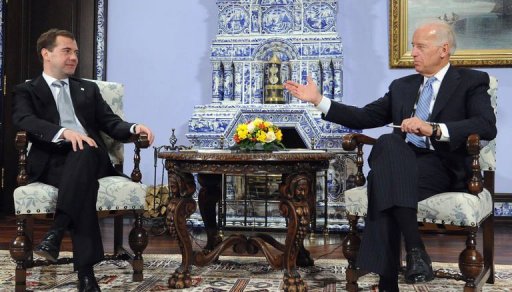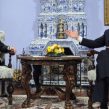
US-Russian Economic “Reset” is Not Happening
Publication: Eurasia Daily Monitor Volume: 8 Issue: 50
By:

The visit of US Vice-President, Joseph Biden, to Moscow last week created a resonance quite out of proportion to its agenda. The hard-won ratification of the START III treaty by the US Senate and the “symmetric” process in the Russian Federal Assembly marked a remarkable success for the “reset” in US-Russian relations launched by the same Biden in early 2009 – but also signified an exhaustion of this process (Ekspert, March 11). Further arms control avenues – including building a joint missile defense system and reduction of non-strategic nuclear arsenals – are being explored but do not promise a fast breakthrough (Nezavisimoye Voyennoye Obozreniye, March 4). Russia’s support for the US and NATO operations in Afghanistan has reached its not very tall ceiling, and the cooperation on the Iranian problem is stalled by the introduction of the US (and the EU) sanctions, on which Moscow has no say, unlike the UN resolutions.
Biden sought to keep the “reset” on track but the rumor that stirred up Moscow’s chattering political classes was that his real aim was to render support to Medvedev’s bid for the presidency and to discourage Putin from going for a third term. The “reliable leaks” about offers to Putin to take instead a high-profile international post, like the president of the International Olympic Committee or the secretary-general of NATO, could have appeared ridiculous if they were not discussed so seriously (www.gazeta.ru, March 10; Ezhednevny Zhurnal, March 11). Meeting with leaders of the opposition Biden did say something about Putin’s choice and the need to put the country’s best interests first (the accounts differ significantly), but on the record, he was impeccably diplomatic (www.besttoday.ru, March 11). His only wit in the exchange with Medvedev was in the words: “But Mr. President, as you know, when President Obama and I were elected…”
The key point of the message that Biden brought to Moscow was the need to move from the political “reset” to an expansion of economic ties that would secure a solid foundation for US-Russian relations (Vedomosti, March 11). The problem with this idea is that it cannot be talked into existence but requires from the US business community a leap of faith in the Russian market. The new inflow of petro-rubles makes the Russian stock exchange interesting for international risk-takers but their input is dwarfed by the massive flight of domestic capital so that the negative balance for the first two months of 2011 is estimated at around $20 billion (www.newsru.com, March 9; Kommersant, February 28). The Russian Central Bank keeps explaining away this “unnatural” behavior by global volatility but it is no secret that a large part of this outpouring is made of capital accumulated by the bureaucratic nomenklatura, which has concluded that the time has come to make the money safe in Western assets (www.gazeta.ru, March 11).
The rise of oil prices in the election year is not taking Russia back to 2007, but delivering it to a new and better kind of mousetrap. The symptoms of a chronic “Dutch disease” are unmistakable, high inflation and rising social costs among them, but they are aggravated by the deep corruption of the executive power leading to its diminishing efficiency, which could perhaps be called the “Russian rheumatism.” This combination of economic maladies was on display last week at the meeting of the State Council presidium on the development of the electricity sector, which Medvedev held near the Sayano-Shushenskaya hydro-power station undergoing restoration after the catastrophe in August 2009. Partial privatization of this sector has left it seriously under-invested, and the non-negotiable demands from the government to limit the increase of tariffs mean that modernization –trumpeted as the strategic imperative and indeed badly needed– becomes unattainable (Vedomosti, March 11).
Another striking feature of the deformed economic recovery in Russia is the extreme concentration of revenues in the top of the social pyramid, so Moscow has again become the top city in the world in the population of extra-rich hosting 79 billionaires (www.forbes.ru, March 10). The wealth accumulated by the 101 Russian billionaires (only 32 were listed in March 2009) has grown much faster than GDP, which could reach the pre-crisis level by the end of 2012 in the absence of new shocks, and the government’s attempts to soften the income disparity by raising pensions are erased by inflation (Rossiyskaya Gazeta, March 11). Unlike in the mid-2000’s, neither the rich, who are becoming spectacularly richer, nor the poor, who are just edging from the poverty line, believe that the new oil boom will last (The New Times, March 7). This skepticism informed by painful experience translates into very different personal choices, as the “haves” seek to hedge against looming risks by demonstrating loyalty but moving money to “safe havens” in the West, while the “have-nots” feel that they are missing out on the last chance to improve their lot and so increase demands for more social benefits.
Biden’s best economic intentions are not very relevant for this slow-growing but over-heating economy where the only sector generating profits comparable with oil is metal mining and smelting, but these export revenues are also at risk from the global slowdown caused by over-priced oil. Modernization projects, like the Skolkovo high-tech “wonder-village,” become in this extraction-and-export economy just schemes for privatizing budget disbursements or for plain money laundering. What makes Biden’s agenda even less practicable is the widespread perception that it is US financial policy that has pumped the bubble into the oil market, so the inevitable tightening of this policy would result in its burst, perhaps in the most delicate moment in the Russian election cycle (www.gazeta.ru, March 9).
As for Biden’s non-existent “hidden” agenda, the readiness of Moscow’s “informed” political circles to believe in his vetting of Medvedev’s flaccid presidential bid testifies to the deep disillusionment among the over-achievers of the 2000’s in Putin’s leadership. They have a lot to lose from political turmoil leading to a redistribution of property and are collectively arriving at the understanding that his return to supreme power might reduce the immediate risk of such turmoil but greatly increase its probability and scale in the mid-term. Biden has in fact asked them without asking: is that really your best bet?




